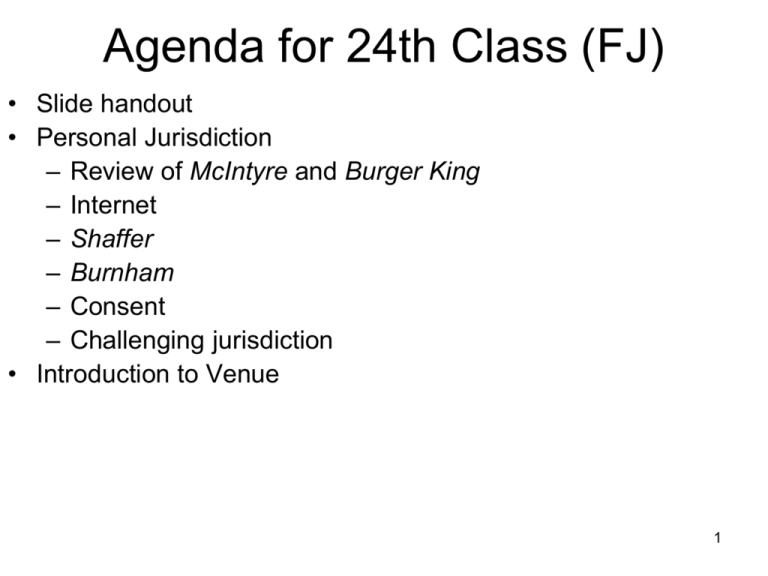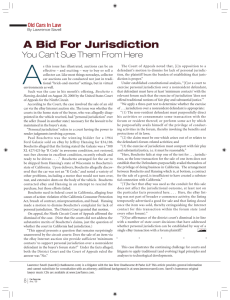Burger King
advertisement

Agenda for 24th Class (FJ) • Slide handout • Personal Jurisdiction – Review of McIntyre and Burger King – Internet – Shaffer – Burnham – Consent – Challenging jurisdiction • Introduction to Venue 1 • • • • Assignment 28 USC 1391, 1404, 1406 Yeazell 174-89 5 Blackboard Questions on Venue Questions to think about / Writing Assignment – Briefly summarize Dee-K Enterprises – P. 176 Q5; pp. 178ff Q1a, 2 – Briefly summarize Piper Aircraft • In your summary, please incorporate answers to pp. 186ff Qs1, 4, – Suppose a chemical plant in India owned by an American company leaks gas into the surrounding neighborhood and kills 16,000 people and injures half a million. The victims sue in US court. Defendants move for dismissal on the basis of forum non conveniens. The plaintiffs argue that dismissal is inappropriate, because Indian courts require a filing fee equal to 5% of damages claimed, which in this case could be billions of dollars. There are long delays in Indian courts. Indian courts have very few tort precedents and none relevant to mass torts. Discovery is usually very narrow, if allowed at all. Should the court grant the forum non conveniens motion? If it does, are there any conditions it should attach? 2 • Optional – Glannon Chapter 8 (Venue), 1 (Personal Jurisdiction), Review of McIntyre – Court continues to be divided on Stream of Commerce – Kennedy + 3. • Defendant must “target” the jurisdiction • Putting product in stream of commerce not enough to show purposeful availment – Ginsburg + 2 • Establishing distribution network to serve whole US sufficient to show purposeful availment of particular U.S. states – Breyer • This case is anomalous. • No jurisdiction, because only a few of McIntyre’s machines were sold to NJ • Seems also to endorse narrow view of O’Connor’s Stream of Commerce Plus approach • But mostly defers real analysis of stream-of-commerce decision for the next case – No majority opinion 3 Review of Burger King • Suppose A is from AL and C is from CA and suppose A and C enter into a contract with each other • Broad interpretation of Burger King: – If A sues C or C sues A, then both AL and CA always have jurisdiction over the case • Narrow interpretation of Burger King – If A sues C, then AL has jurisdiction over the case only if: • the contract was part of a continuing commercial relationship between A and C, and/or • the defendant was sophisticated – Similar analysis if C sues A in CA 4 Jurisdiction & Internet • Revell – No jurisdiction in state X simply because website defamed victim residing in state X – Must also show events discussed and/or readership were in victim’s state • Tries to narrow Calder “effects test” • Zippo – Jurisdiction depends on how active the website was – Note that Zippo was only district court decision – Unclear theoretical basis • Why should defamation be less likely to establish jurisdiction where viewed if posting was by website owner on passive website than if posting was by 3rd party on interactive website? 5 • Handout Problems 2-18 & 2-19 Schaffer • Briefly summarize Shaffer • P. 100ff Q3, 4 • Is jurisdiction proper in the following situation? – Car accident in West Dakota – Defendant is citizen & resident of California – Defendant owns real property in West Dakota – Plaintiff is citizen of West Dakota – Suit in West Dakota state court – West Dakota has the following long-arm statute: • “West Dakota trial courts may exercise jurisdiction over an individual only if that individual is a resident or citizen of West Dakota or if the individual owns real property in West Dakota.” – Remember to consider both whether there is statutory authorization for jurisdiction and whether jurisdiction is constitutional 6 Burnham • Briefly summarize Burham • Do you think jurisdiction based on presence makes sense? Should it be constitutional? – How far would you extend jurisdiction based on presence? In answering that question, consider: • Pp. 145ff Q 3 • Grace v. MacArthur, summarized on slide 5 of Class 17 handout • Given that Burnham is now established law, how do you think courts should resolve the cases described in – Pp. 145ff Q 3 Grace v. MacArthur, summarized on slide 5 of Class 17 handout 7 Consent to Jurisdiction • Consent was basis for in personam jurisdiction before Intl Shoe • Consent continues to be basis for jurisdiction • 3 kinds of consent – Consent after sued in particular forum – Failure to object / waiver – Forum selection clause in contract • Note difference from choice of law clause • Carnival Cruise Lines – Choice of law clauses generally enforceable – Forum must be reasonable – Can‘t be chosen just to inconvenience plaintiff – Ok if some relationship to dispute • E.g. defendant's headquarters state • Even if inconvenient to plaintiffs • Strategy – Almost always advantageous to include choice of forum and choice of law clauses in contracts – Mutually advantageous to reduce uncertainty – Especially beneficial if your client has bargaining power to choose 8 advantageous law and forum 2 Ways to Challenge Jurisdiction • In court where sued – Make 12(b)(2) motion or state equivalent – “Special appearance” means defendant appears in court solely to challenge jurisdiction • Otherwise, appearance in court could be construed as consent to jurisdiction • Collateral attack – Only possible where defendant does not have assets in forum • So plaintiff would have to enforce judgment in state where defendant has assets • Enforcing judgment in another state requires separate suit in that state – But Full Faith & Credit Clause of US Constitution requires state to respect judgment of another state, IF THE STATE WHICH RENDERED THE JUDGMENT HAD JURISDICTION – Defendant does not appear in court where sued – Default judgment is entered against defendant – When plaintiff goes to enforce judgment in state where defendant has assets, defendant raises lack of personal jurisdiction as defense – Very risky, because if enforcing court decides the original court had 9 jurisdiction, defendant cannot then challenge judgment on merits 2011 Exam • 2011 Exam question II.4 – Note typo. “delivery” should be “delivering 10 Introduction to Venue • What court within a state? – State court: LA Superior Court or San Francisco Superior Court – Federal court. If state has more than one district, which district • S.D.N.Y or E.D.N.Y. • Purely statutory – No constitutional constraint – States have own statutes – Federal statute is 1391 • Transfers – Can transfer case between federal districts for convenience – Cannot transfer case between court systems • E.g. from MA court to CA court • E.g. from US court to UK court • But sometimes court will dismiss case over which jurisdiction and venue are proper, but when a court in another court system would be more appropriate – Forum non conveniens 11





